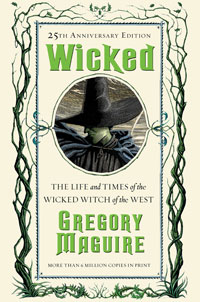
Wicked: Life and Times of the Wicked Witch of the West
by Gregory Maguire
MONDAY, OCTOBER 11, 2021
Synopsis
Following the traditions of Gabriel García Marquez, John Gardner and J.R.R. Tolkien, Wicked is a richly woven tale that takes us to the other, darker side of the rainbow as novelist Gregory Maguire chronicles the Wicked Witch of the West’s odyssey through the complex world of Oz—where people call you wicked if you tell the truth.
Years before Dorothy and her dog crash-land, another little girl makes her presence known in Oz. This girl, Elphaba, is born with emerald-green skin—no easy burden in a land as mean and poor as Oz, where superstition and magic are not strong enough to explain or to overcome the natural disasters of flood and famine. But Elphaba is smart, and by the time she enters the university in Shiz, she becomes a member of a charmed circle of Oz’ most promising young citizens.
Elphaba’s Oz is no utopia. The Wizard’s secret police are everywhere. Animals—those creatures with voices, souls and minds—are threatened with exile. Young Elphaba, green and wild and misunderstood, is determined to protect the Animals—even if it means combating the mysterious Wizard, even if it means risking her single chance at romance. Even wiser in guilt and sorrow, she can find herself grateful when the world declares her a witch. And she can even make herself glad for that young girl from Kansas.
In Wicked, Gregory Maguire has taken the largely unknown world of Oz and populated it with the power of his own imagination. Fast-paced, fantastically real and supremely entertaining, this is a novel of vision and re-vision. Oz never will be the same again.
(From the publisher)
[/one_half]Reading Group Discussion Questions
1. When Dorothy triumphed over the Wicked Witch of the West in L. Frank Baum’s classic tale, we heard only her side of the story. But what about her arch-nemesis, the mysterious witch? Where did she come from? How did she become so wicked? And what is the true nature of evil?
2. Gregory Maguire fashioned the name of Elphaba (pronounced EL-fa-ba) from the initials of the author of The Wizard of Oz, Lyman Frank Baum-L-F-B-Elphaba. Wicked derives some of its power from the popularity of its source material. Does meeting up with familiar characters and famous fictional situations require more patience and effort on the part of the reader, or less?
3. Wicked flips the Oz we knew from the classic movie on its head. To what extent does Maguire’s vision of Oz contradict the Oz we’re familiar with? How have Dorothy and the other characters changed or remained the same? Has Wicked changed your conception of the original? If so, how?
4. The novel opens with a scene in which the Witch overhears Dorothy, the Lion, the Scarecrow, and the Tin Woodman gossiping about her. She’s “possessed by demons,” they say. “She was castrated at birth…she was an abused child…she’s a dangerous tyrant.” How does this scene set the stage for the story, and what themes does it introduce?
5. What is the significance of Elphaba’s green skin? What are the rewards of being so different, and what are the drawbacks? In Oz — and in the real world — what are the meanings associated with the color green, and are any of them pertinent to Elphaba’s character?
6. One of Wicked’s key themes is the nature and roots of evil. What are the theories that Maguire sets out? Is Elphaba evil? Are her actions evil? Is there such a thing as evil, a free-floating power in the universe like time or gravity? Or is evil an attribute of the actions of human beings? (Hint: Turn to pages 231 and 370 for scenes that will draw you into the conversation.)
7. Discuss the importance of the Clock of the Time Dragon. Does the Clock simply reflect events, or does it shape them? Why is it significant that Elphaba was born inside it? That Turtle Heart was killed by it? What revelations does it offer to Elphaba and the reader when she reencounters it at the end of the book?
8. The first section of the book ends powerfully but enigmatically when the young Elphaba is discovered under the dock, cradled in the paws of a magical beast as if sitting on a throne. How do you interpret this scene, and what do you think it foretells, if anything?
9. The place of Animals in society is an important theme in Wicked. Why does Elphaba make it her mission to fight for Animal rights? How else does social class define Oz, and why?
10. [Galinda] reasoned that because she was beautiful she was significant, though what she signified, and to whom, was not clear to her yet” (page 65). Discuss the transformation of Galinda, shallow Shiz student, to Glinda the Good Witch. How does she change — and by how much? What is her eventual “significance,” both in Oz and in the story?
11. Discuss the ways in which Elphaba’s determination and willfulness lend purpose and order to her life, and the cost of being such a strong character. Elphaba isn’t the only strong female character in Wicked. How do Nessarose, Glinda, and Sarima deal with the issues of power and control? Where do each of them draw strength from? Is the world of Maguire’s Oz more or less patriarchal than millennial America?
12. Wicked is an epic story, built along the lines of a Shakespearean or Greek tragedy, in which the seeds of Elphaba’s destiny are all sown early in the novel. How much of Elphaba’s career is predestined, and how much choice does she have? Do you think that she was no more than a puppet of the Wizard or Madame Morrible, as she fears?
13. Early in their unlikely friendship, Galinda catches a glimpse of Elphaba and thinks she “looked like something between an animal and an Animal, like something more than life but not quite Life” (pages 78-79). Discuss the dual, and sometimes contradictory, nature of Elphaba’s character. Why does Elphaba insist that she doesn’t have a soul?
14. Who or what is Yackle? Where does she appear in the story, and what role does she serve in Elphaba’s life? Is she good or evil — both or neither?
15. Was Elphaba’s story essentially a tragedy or a triumph? Did she fail at every major endeavor, and thus fail at life; or because she refused to give up or change to suit the opinions of others, was her life a success? Is there a possibility that Dorothy’s “baptismal splash” redeemed Elphaba on her deathbed, or was this the final indignity in a life of miserable mistakes?
(Questions issued by publisher.)
Additional Book Club Resources
Other Works by Gregory Maguire
Novels
• The Wicked Years:
• Wicked: The Life and Times of the Wicked Witch of the West (1995)
• Son of a Witch (2005)
• A Lion Among Men (2008)
• Out of Oz (2011)
• Confessions of an Ugly Stepsister (1999)
• Lost (2001)
• Mirror, Mirror (2003)
• The Next Queen of Heaven (2010)
• Tales Told in Oz (2012)
• After Alice (2015)
• Hiddensee: A Tale of the Once and Future Nutcracker (2017)
• A Wild Winter Swan (2020)
Short stories
• Scarecrow (2001), published in Half-Human edited by Bruce Coville (Note: This is the life story of the Scarecrow from The Wonderful Wizard of Oz, but is not a part of The Wicked Years.)
• Fee, Fie, Foe et Cetera (2002), published in The Green Man: Tales from the Mythic Forest
• The Oakthing (2004), published in The Faery Reel: Tales from the Twilight Realm
• Chatterbox, published in I Believe in Water: Twelve Brushes With Religion
• The Honorary Shepherds (1994), published in Am I Blue?: Coming Out From The Silence
• Beyond the Fringe (1998) published in A Glory of Unicorns
• The Seven Stage a Comeback (2000) published in A Wolf at the Door and Other Retold Fairy Tales
• Matchless: A Christmas Story (2009)
• The Silk Road Runs Through Tupperneck, N.H. (2009), published in How Beautiful the Ordinary: Twelve Stories of Identity
• In That Country (2012), published in Parnassus Literary Arts Magazine
Non-fiction
• Innocence and Experience: Essays and Conversations on Children’s Literature (ed., with Barbara Harrison) (1987)
• Origins of Story: On Writing for Children (ed., with Barbara Harrison) (1999)
• Making Mischief: A Maurice Sendak Appreciation (2009)
If You Liked Wicked, may we recommend …
The Wonderful Wizard of Oz, L. Frank Baum
The Princess Bride, William Goldman
Stardust, Neil Gaiman
The Magicians, Lev Grossman
Miss Peregrine’s Home for Peculiar Children, Ransom Riggs
The Night Circus, Erin Morgenstern
The Mists of Avalon, Marion Zimmer Bradley
Jonathan Strange & Mr Norrell, Susanna Clarke
The Once and Future King, T.H. White
Good Omens: The Nice and Accurate Prophecies of Agnes Nutter, Witch, Terry Pratchett

